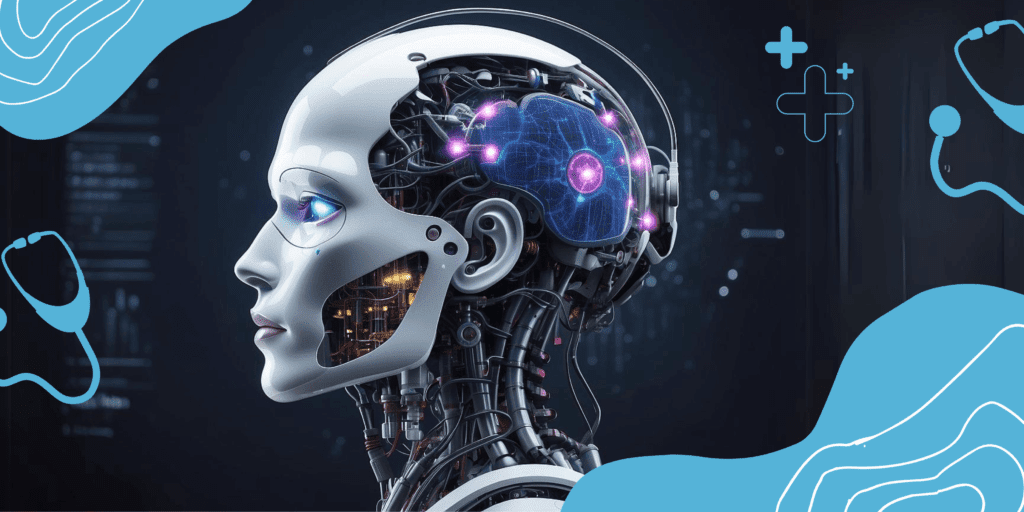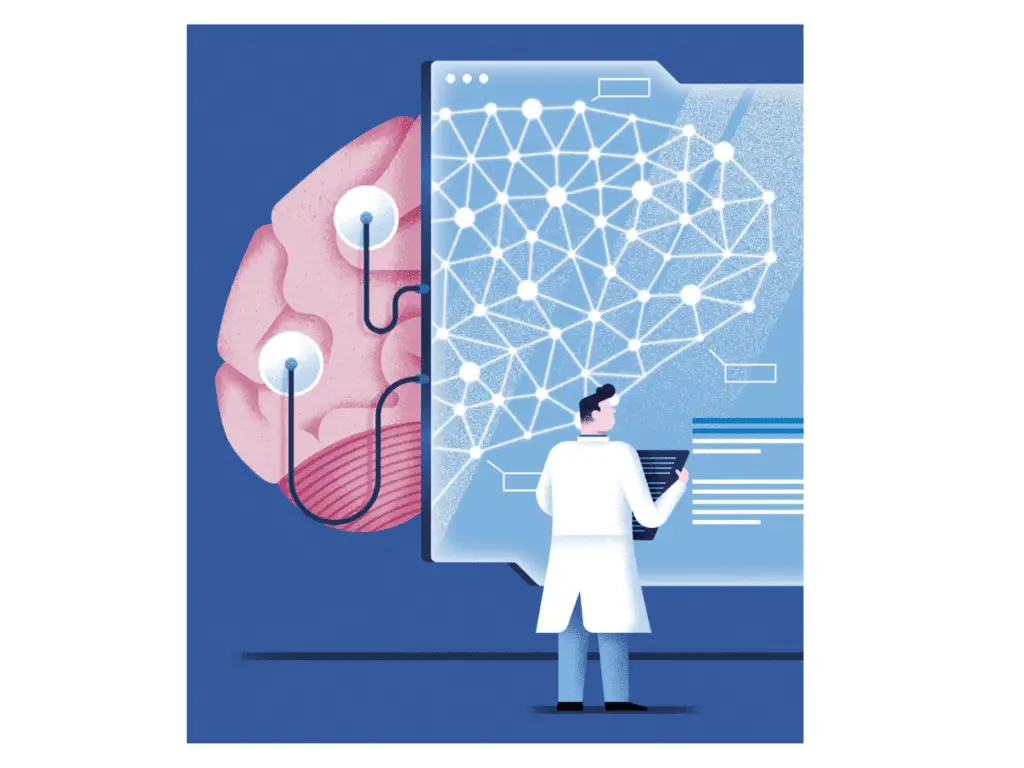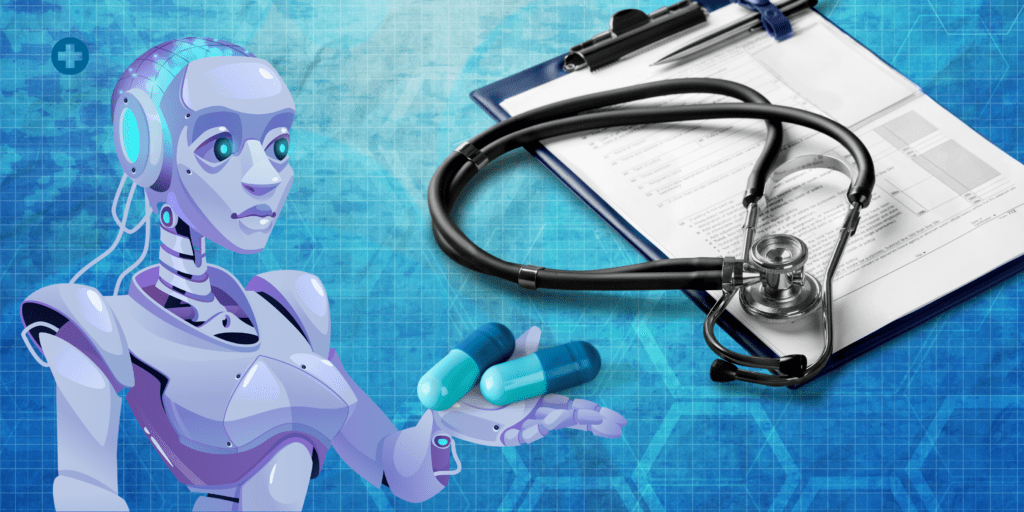In the rapidly evolving landscape of healthcare technology, artificial intelligence (AI) integration stands at the forefront of innovation. A significant stride in this direction is the development of the Articulate Medical Intelligence Explorer (AMIE), an AI system designed specifically for diagnostic reasoning and conversation within medical contexts.
Developed by Google Research, AMIE represents a breakthrough in AI’s application in healthcare, leveraging the capabilities of large language models (LLMs) to enhance and potentially transform diagnostic processes, unlike traditional AI applications.
AMIE is uniquely optimized for medical dialogues, aiming to improve diagnostic accuracy, clinician support, and patient care through sophisticated conversational abilities and empathetic communication.
This introduction to AMIE will delve into its purpose, development, and promising potential for revolutionizing healthcare diagnostic practices.
Development of AMIE
The genesis of AMIE (Articulate Medical Intelligence Explorer) lies in the urgent need for advanced diagnostic tools in the medical field, where accuracy and effective communication are paramount.
Recognizing the potential of artificial intelligence in bridging this gap, Google Research embarked on developing it, drawing inspiration from the successes of large language models (LLMs) in non-medical domains.
Unlike conventional AI systems, is intricately designed to mimic medical dialogues’ nuanced and complex nature. This feature sets it apart in the realm of healthcare technology. This development was driven by the vision to enhance diagnostic accuracy and foster empathetic interactions between clinicians and patients.
Thereby elevating the standard of care. The strategic incorporation of medical reasoning, summarization, and real-world clinical conversations into AMIE’s training regimen underscores its innovative approach, setting a new benchmark for AI applications in healthcare.
Training and Optimization of AMIE
Google Research’s medical AI system, represent a meticulous blend of technology and healthcare expertise. Central to this process were diverse and comprehensive datasets encompassing medical reasoning, medical summarization, and clinical conversations.
This rich data foundation allowed a nuanced understanding of medical dialogues and diagnostic processes. It was subjected to an innovative training regimen involving self-play and simulated diagnostic dialogues to further enhance its capabilities.
This unique approach enabled the system to refine its skills in a controlled yet realistic environment, simulating various medical scenarios. The goal was to equip AMIE with factual medical knowledge and fine-tune its conversational and diagnostic skills, ensuring a balance between technical accuracy and empathetic patient engagement.
This careful optimization process positions AMIE as a cutting-edge tool in AI-driven medical diagnostics, poised to make significant contributions to healthcare efficiency and patient care.
Evaluation of AMIE’s Performance
The performance of AMIE was rigorously evaluated through a well-structured, randomized, double-blind crossover study focusing on text-based consultations.
This evaluation pitted AMIE against board-certified primary care physicians (PCPs) in simulated consultations with patient actors designed to mimic real-world clinical scenarios. This approach drew inspiration from the objective structured clinical examination (OSCE) format, renowned for its effectiveness in assessing clinical competencies.
The findings were remarkable: AMIE demonstrated high diagnostic accuracy, often surpassing the PCPs in various clinically significant metrics. This performance was not limited to diagnostic precision alone; AMIE excelled in clinical communication, a critical element in patient care.
These results underscored AMIE’s potential as a transformative tool in medical diagnostics, offering insights into how AI can complement and enhance the capabilities of healthcare professionals.

Methodological Innovations in AMIE
AMIE’s development featured several methodological innovations, setting it apart in AI-driven healthcare solutions. A cornerstone of its training was using a self-play-based simulated learning environment. This novel approach allowed AMIE to engage in simulated diagnostic dialogues with an AI patient simulator.
This environment was instrumental in refining AMIE’s conversational abilities, ensuring a more realistic and practical interaction in medical contexts. Complementing this, an inference time chain-of-reasoning strategy was employed, enabling AMIE to dynamically adjust its responses based on the evolving conversation.
This strategy allowed for a more nuanced and contextually relevant dialogue, crucial for accurate medical diagnostics. Together, these methodological innovations honed AMIE’s technical capabilities and its ability to engage in empathetic and effective communication, mirroring the intricacies of real-world clinical interactions.
These advancements signify a significant leap in the application of AI in healthcare, promising enhanced diagnostic accuracy and improved patient outcomes.
Limitations and Challenges
Despite the groundbreaking achievements of AMIE, its development and application come with notable limitations and challenges that warrant careful consideration.
Firstly, the evaluation technique, primarily based on text-chat interfaces, may need to fully encapsulate the complexity and nuance of real-world human conversations, potentially underestimating the value of traditional clinician-patient interactions.
This highlights the need for further research to adapt and optimize AI systems like AMIE for more realistic clinical settings. Secondly, transitioning AMIE from a research prototype to a robust, clinically applicable tool involves addressing many critical issues.
These include ensuring health equity and fairness, safeguarding patient privacy, maintaining robustness against various types of data and scenarios, and guaranteeing safety and reliability. Addressing these challenges is essential for the responsible integration of AI in healthcare, ensuring that such technologies complement rather than replace the human elements of medical practice.
AMIE as a Clinical Aid
The role as a clinical aid was rigorously evaluated in a study involving challenging real-world medical cases sourced from the New England Journal of Medicine. In this study, AMIE demonstrated impressive standalone performance and significantly enhanced clinicians’ diagnostic capabilities when used as an assistive tool.
Twenty generalist clinicians were involved, each assessing complex medical cases with and without AMIE’s assistance. The results were on its own, outperformed unassisted clinicians regarding diagnostic accuracy.
Furthermore, when AMIE aided clinicians, they showed a notable improvement in forming comprehensive differential diagnoses compared to those who relied on traditional search engines and medical resources.
These findings underscore the potential of AMIE not just as an independent diagnostic tool but also as a valuable asset in augmenting the clinical decision-making process, paving the way for a new era in AI-assisted healthcare.
Ethical and Professional Considerations
The integration of AI systems like in healthcare necessitates a thorough consideration of ethical and professional standards. As AI plays a more significant role in clinical decision-making, ensuring that these systems adhere to the highest standards of safety, quality, and ethical practice is imperative.
This includes safeguarding patient privacy, data security, and transparency in AI decision-making processes. Additionally, there is a pressing need to address health equity and fairness issues, ensuring that AI tools do not perpetuate existing biases or inequalities in healthcare delivery.
Professional considerations also play a crucial role; AI should support, not replace, the clinician’s judgment, fostering a synergistic relationship between technology and medical expertise.
The development and deployment of AI in healthcare must be guided by a commitment to these principles, ensuring that such advancements are aligned with the core values of trust, compassion, and professionalism that define the medical profession.

Final Thoughts
The development of AMIE marks a significant milestone in the intersection of AI and healthcare, offering promising advancements in diagnostic accuracy and clinical decision-making.
Its innovative training methodologies and remarkable performance in simulated studies highlight the potential of AI to revolutionize medical diagnostics and patient care. However, the journey ahead is complex and filled with challenges requiring careful navigation.
Ethical considerations, fairness, privacy, and the integration of AI into the human-centric healthcare field are paramount concerns that must be addressed as we move forward.
As we embrace these technological advancements, it is crucial to maintain a balance – leveraging AI as a powerful tool to augment, not replace, the human elements of empathy, understanding, and clinical expertise that are the hallmarks of quality healthcare. As exemplifies, the future of AI in medicine is bright and holds immense potential. Still, it must be pursued with a conscientious and responsible approach to truly benefit society.


